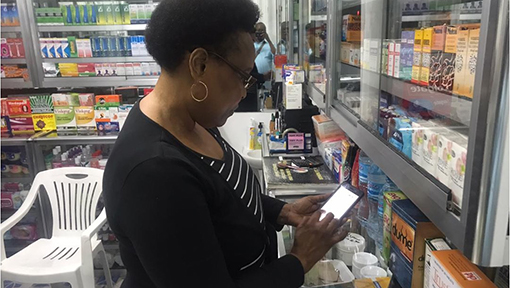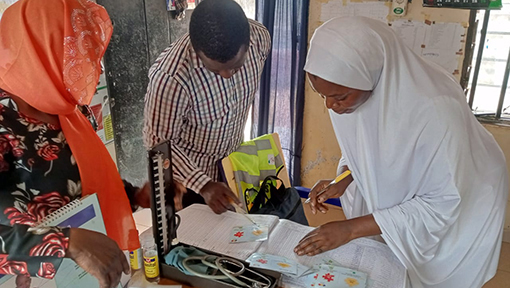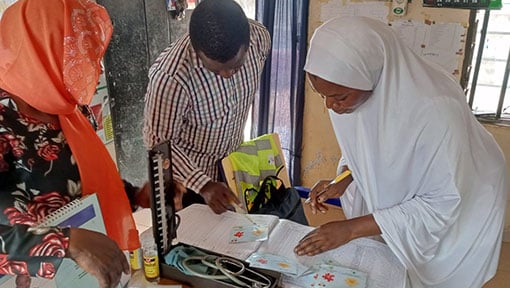Engaging Private Sector Pharmacies in East Africa to Increase Access to Contraceptive Services
Contributors: Levis Onsase, Morine Sirera, Patrick Waweru, Albert Bwire, Grace Mugabi, Waziri Njau and Freda Nyaga

A pharmacist in Arusha capturing data onto the TCI dashboard on client referrals to facilities.
Consensus is growing in the family planning community to change its approach to addressing the challenge of unmet need for modern contraception. Among the challenges to be addressed are what young people experience when accessing the public health system and, if they are treated poorly, how that may affect their uptake of contraception.
In partnership with the Ministries of Health (MOH) in Kenya, Tanzania and Uganda, The Challenge Initiative (TCI) examined gaps in access to contraceptive services by young people. Results for the Youth Respondent Driven Sampling Survey found that 34% of the adolescent and youth population in Kenya and 38% in Uganda access services for contraceptive from pharmacies (source: PMA Agile). Evidence suggests that pharmacies and drug shops are an untapped source for comprehensive family planning service delivery for adolescents and youth because they are easily accessible and approachable,. They also offer some level of privacy, confidentiality and non-judgement. As a result, TCI has engaged pharmaceutical and drug shop associations to not only increase access to contraceptive services by young people but also improve the knowledge, attitudes and skills of pharmacists and drug shop operators on how to deliver adolescent and youth-friendly services.
The pharmacists and drug shop operators have been oriented on national guidelines for family planning and youth-friendly services, how to make referrals to nearby public facilities, and the importance of documentation and reporting on services provided as well as referrals made.
Chitechi Amboka, the Secretary General for the Coast Branch of the Kenya Pharmaceutical Association (KPA), explains why KPA got involved in TCI’s pharmacy engagement strategy:
As Kenya Pharmaceutical Association, we have partnered with The Challenge Initiative and Ministry of Health to create capacity among our members to ensure provision of quality services among adolescents and youth. If we tap on the data being collected on young people accessing contraception at pharmacies, we can improve our county family planning indicators.”
During a recently held webinar on the topic, we learned how each country in East Africa has slightly adapted the strategy based on national guidelines as well as how pharmacies and drug shops are governed. However, the steps remained more or less the same.
- Identify potential stakeholders in the public and private sector, including pharmacy councils, pharmaceutical associations and pharmacy schools to collaborate with.
- Map and assess pharmacies and drug shops who meet the basic selection criteria and are willing to participate in the strategy
- Assess capacity of the pharmacies and drug shops that meet the basic selection criteria
- Provide pharmacy and drug shop training and coaching on family planning and youth-friendly services to all relevant staff
- Establish an active referral system whereby pharmacists refer clients to the closest TCI-supported health facility to track effectiveness and follow-on care related to provision of contraceptive services
- Provide IEC materials and job aids that are youth-oriented
- Conduct onsite supportive supervision visits
- Regularly review data from pharmacies and drug shops with pharmacists and operators and MOH on a monthly or at least quarterly basis
As a result of these steps, data from TCI’s project records system indicates a high utilization of contraception services among young people. Since TCI’s pharmacy engagement strategy started in Kenya in October 2019 to October 2020, 36,933 individuals have received contraceptive services from pharmacies with the majority (33%) receiving emergency contraceptive, followed by condoms (28%), pills (25%) and injectables (13%). See the pie chart and table (below).
Given the success of this strategy, TCI plans to scale it up further to an additional 100 new pharmacies in Kenya and 50 new pharmacies in Uganda. To learn more about TCI’s pharmacy engagement strategy, check out the guidance and tools provided on TCI University as well as the recording of the webinar below.








